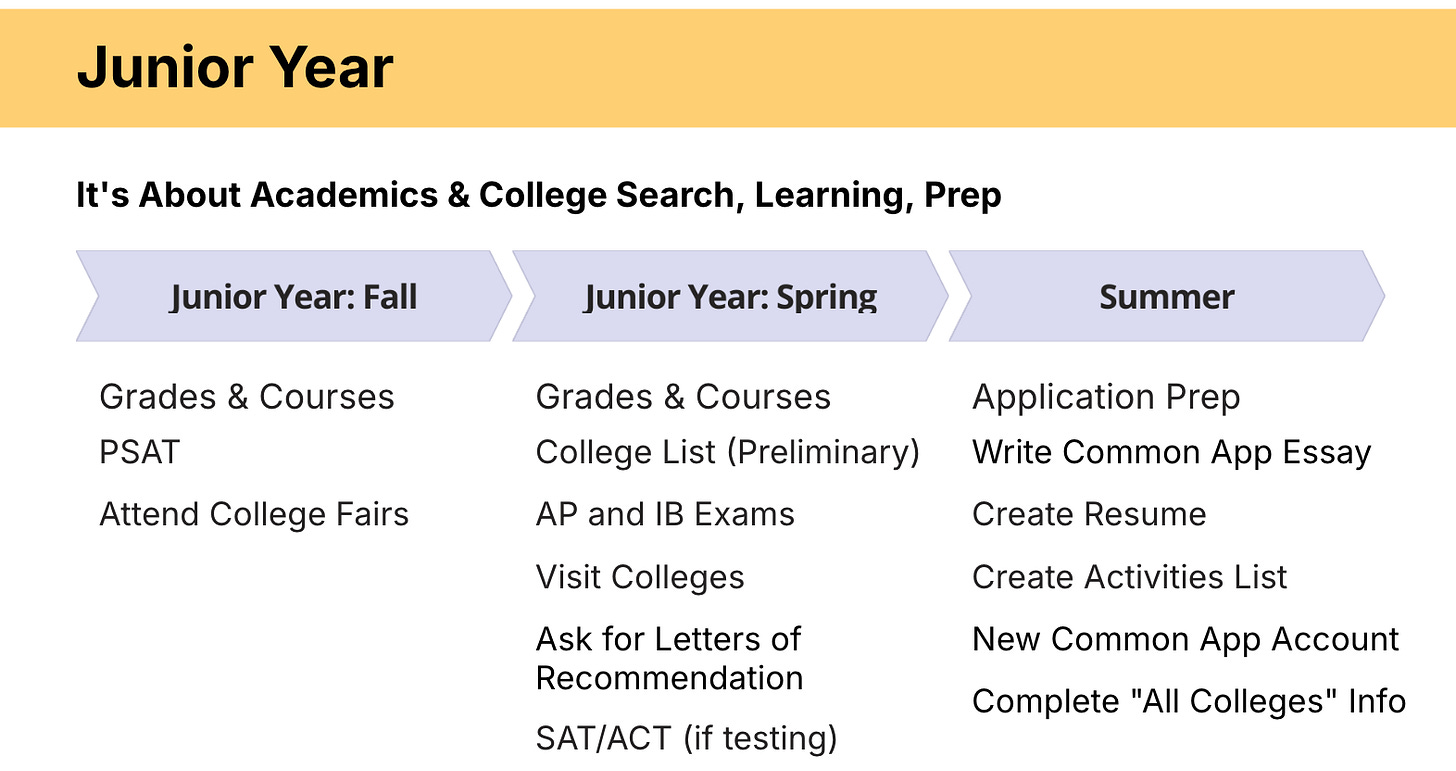What to Focus on Junior Year of High School
Discover how to make the most of your junior year with tips on testing, extracurriculars, and college planning.
If you’re wondering, “What should I be doing during high school to prepare for college?” you’re not alone.
Here’s a clear year-by-year guide to help you focus on what matters most:
Freshman and Sophomore Years: Academic and activities foundations + exploration.
Junior Year: High academics + college search, learning, and prep.
Senior Year: Applying and deciding.
Last week we covered focus areas for Freshman and Sophomore Years of High School.
In this post, we’ll focus on Junior Year—when your efforts shift from foundational work to active preparation for college.
Junior Year: College Search, Learning, and Prep
Your junior year is a pivotal time in the college admissions process. It’s when you start taking tangible steps toward identifying your best-fit colleges and preparing for applications.
Here’s what to focus on throughout the year:
Fall: Get Started with Testing and Exploration
PSAT (National Merit Scholarship Qualification). Take the PSAT seriously. It’s a great opportunity to prepare for standardized tests and, for top scorers, qualify for scholarships. Use it as a low-pressure way to see where you stand and whether or not it makes sense for you to prioritise standardised testing as a part of your college application packet.
Attend College Fairs. Many high schools and community organizations host college fairs in the fall. Attend these events to meet college representatives, ask questions, and start building your college list. Bonus: It’s a great way to practice talking to admissions officers.
Spring: Build Momentum Towards College Admissions
Research Colleges and Build Your Initial College List. Begin researching colleges that align with your interests, goals, and potential majors. Use resources like college websites, guidebooks, and virtual tours to learn more about programs, campus culture, and location. Start drafting a preliminary college list, and help with this can be found in my past posts about how to research colleges and 10 sources of inspiration to broaden your college search.
Standardized Testing (SAT/ACT). If you plan to submit test scores, spring is the time to register for and take the SAT or ACT. Use the winter months to study and consider taking a prep course or using free online resources. Important data point to remember - the majority of college applicants will end up NOT submitting SAT/ACT scores as part of their applications.
AP/IB Exams. Do your best on these exams if you’re enrolled in AP or IB courses. They can earn you college credit and demonstrate academic rigor.
Visit Colleges. Spring break is an excellent time to visit colleges on your list. Walk around campus, sit in on a class, and talk to current students. Virtual tours are also a great option if travel isn’t feasible. Don’t overlook colleges that are very close to you. Even if you are not interested in attending these schools, going on tours can provide you interesting information and comparison points when seeing other colleges.
Ask for Letters of Recommendation. Before the school year ends, approach teachers who know you well and can speak to your strengths. Ideally, these should be teachers from your Junior Year. More info on recommenders in this previous post.
Summer: Lay the Groundwork for Your Applications
Write Your Personal Essay. The Common App essay prompts are usually released in the spring. Use the summer to brainstorm, draft, and refine your essay. Starting early will reduce stress during senior year.
Build Your Resume and Activity List. Create a polished resume that highlights your extracurriculars, work experience, and leadership roles. This will help with applications and scholarship submissions.
Create a Common App Account (August). The Common App typically opens on August 1. Take some time to familiarize yourself with the platform, fill out basic information, and start compiling materials.
All Year: High School Courses & Grades
Colleges pay the most attention to your class choices and academic performance in Junior year of high school.
Why? Because these classes offer the best view into your preparation for college learning.
Here’s some important additional information on this from a college admission perspective:
Rigour
Junior year classes are typically much more difficult than early high school year classes, and thus a better proxy for learning expectations in college. Instead of French I (an intro class), you’re taking French III. Instead of Algebra I or Geometry you’re taking Algebra II w/ Trigonometry or Pre-Calculus. Colleges want to see how you’ve progressed as a student, and how you’ve challenged yourself.
Trajectory
In the early years of high school, you’re getting used to high school expectations, and getting your feet under you. Colleges want to see that you continue to perform well academically as course difficulty ramps up. A positive sign is that your grades stay consistent, or even get better, Junior year.
Interests
If you followed my guidance and spent time Freshman and Sophomore Years exploring and “trying on” different subject areas, clubs, and athletics… then use Junior year to take what you’ve discovered about yourself and double-down on the areas you are most interested in. Deepen your engagement on the classes and activities you really like.
Grades
Most of you will apply to colleges in the fall of their Senior Year… before you’ve received grades from any of your Senior year coursework.
Therefore, your academic performance during junior year is critical—it’s the last full year of grades that colleges will see when you apply.
Take challenging (but manageable) courses.
Stay organized and proactive about assignments and exams.
Seek help if you’re struggling—tutors, teachers, or study groups can make a big difference.
What’s Next?
Junior year is all about positioning yourself for success. By focusing on academics, starting your college search, and preparing for applications, you’ll be well ahead of the game when senior year arrives.
In the next post, we’ll tackle Senior Year—applying and deciding. For now, enjoy the journey, and remember: the hard work you put in now will pay off later!




